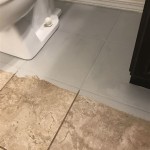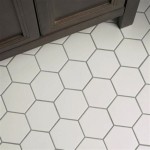Can You Use Floor Tile On Walls Of Shower?
The question of whether floor tile can be used on shower walls is a common one in bathroom renovation and design. While seemingly straightforward, the answer involves careful consideration of various factors, including tile properties, installation techniques, and the overall functionality of the shower space. Understanding these considerations is crucial for ensuring a successful and long-lasting tile installation.
Floor tiles are often designed with specific characteristics that differ from wall tiles. These differences relate to their durability, slip resistance, and weight. Consequently, using floor tiles on walls requires a thorough assessment of these features to ensure they meet the demands of a vertical shower surface.
Weight and Adhesion
One of the primary concerns when using floor tile on shower walls is the weight of the tile. Floor tiles are typically thicker and denser than wall tiles, resulting in a heavier product. This added weight places greater stress on the adhesive used to secure the tiles to the wall. If the adhesive is not strong enough or if the application is flawed, the tiles can detach from the wall, posing a safety hazard and leading to costly repairs.
Proper surface preparation is paramount to ensuring adequate adhesion. The wall surface must be clean, dry, and free of any loose debris or contaminants. Applying a suitable primer can improve the bonding strength between the adhesive and the wall. It is also essential to use a high-quality adhesive specifically designed for use with heavy tiles on vertical surfaces. These adhesives typically have higher bond strengths and are formulated to resist moisture and mildew growth, which are common in shower environments.
The size of the tile also influences the weight distribution and the stress on the adhesive. Larger floor tiles exert more force due to their increased surface area and weight. In such cases, additional support mechanisms, such as mechanical fasteners or specialized adhesives, may be necessary to ensure long-term stability. Consulting with a professional tile installer is highly recommended to determine the appropriate adhesive and installation techniques for specific tile types and sizes.
Furthermore, the substrate to which the tiles are being applied plays a significant role in the success of the installation. Cement backer boards are often preferred over gypsum board in shower applications due to their superior water resistance and ability to provide a stable and durable surface for tile adhesion. Ensuring that the substrate is properly installed and prepared is crucial for preventing moisture intrusion and tile failure.
Slip Resistance and Texture
Floor tiles are designed to provide slip resistance underfoot, a crucial safety feature in areas prone to moisture. This slip resistance is typically achieved through textured surfaces or specialized coatings. While slip resistance is essential on floors, it is generally less critical on shower walls. However, the texture of a floor tile used on a wall can impact the overall aesthetic and cleaning requirements.
Heavily textured floor tiles can accumulate soap scum and other residues more readily than smooth wall tiles. This can make cleaning more challenging and require the use of specialized cleaning products or techniques. It is essential to consider the maintenance implications of using a textured floor tile on a shower wall before making a final decision.
The aesthetic appeal of the textured surface should also be considered. While some may appreciate the visual interest and tactile feel of a textured tile, others may prefer the clean and minimalist look of a smooth wall tile. Ultimately, the choice depends on personal preference and the overall design aesthetic of the bathroom.
In cases where slip resistance is desired on shower walls, specialized wall tiles with slip-resistant coatings or textures are available. These tiles offer a balance between safety and aesthetics, providing a secure grip while maintaining a visually appealing surface. These are sometimes incorporated into shower niches, benches, or accent walls.
Water Absorption and Durability
Floor tiles are typically manufactured to withstand higher levels of wear and tear compared to wall tiles. They are designed to resist abrasion, impact, and the constant traffic of foot traffic. This enhanced durability is often achieved through the use of denser materials and specialized manufacturing processes. Using floor tiles on shower walls can provide an added layer of protection against moisture and physical damage. However, it is crucial to consider the water absorption rate of the tile.
The water absorption rate, also known as porosity, refers to the amount of water a tile can absorb. Tiles with low water absorption rates are less susceptible to staining, cracking, and other forms of water damage. Porcelain tiles, for example, have very low water absorption rates and are well-suited for use in shower environments. Natural stone tiles, on the other hand, may have higher water absorption rates and require sealing to protect them from moisture.
When selecting floor tiles for shower walls, it is essential to choose tiles with low water absorption rates. This will help prevent moisture from penetrating the tile and damaging the underlying substrate. Proper sealing and regular maintenance can further enhance the water resistance of the tile and extend its lifespan.
The durability of the tile is also an important consideration. Shower walls are exposed to moisture, temperature fluctuations, and potential impacts from shower accessories. Choosing a durable tile that can withstand these conditions is essential for ensuring a long-lasting and aesthetically pleasing shower environment. Porcelain tiles, known for their strength and durability, are often a popular choice for both floor and wall applications in showers.
The grout used between the tiles also plays a crucial role in protecting the shower walls from moisture. Epoxy grout, for example, is highly water-resistant and stain-resistant, making it an excellent choice for shower applications. Cement-based grout, on the other hand, is more porous and may require sealing to prevent moisture penetration. Regular cleaning and maintenance of the grout are essential for preventing mildew growth and maintaining the overall integrity of the shower walls.
In conclusion, while floor tiles *can* be used on shower walls, it's essential to carefully evaluate factors such as weight, adhesion, slip resistance, texture, water absorption, and durability.

Can You Use Floor Tile On A Wall

Can You Use Floor Tile On A Wall

Bathroom Tile Idea Use The Same On Floors And Walls

5 Reasons Ceramic Tiles Work In Bathrooms Direct

Tiling Your Bathroom How Much Types Of Tiles You Will Need

Best Tiles For Shower Walls And Floors Modernize

Bathroom Tile Idea Use Large Tiles On The Floor And Walls 18 Pictures Wall Grey Marble

Do You Need To Tile The Entire Bathroom Or Is It Ok Just Bath Shower Quora

Benefits Of Using Cement Tiles For Bathroom Floors And Walls

Pros Cons And Advantages Disadvantages Of A Ceramic Tile Shower With Alternatives Innovate Building Solutions Blog Home Remodeling Design Ideas Advice
Related Posts








